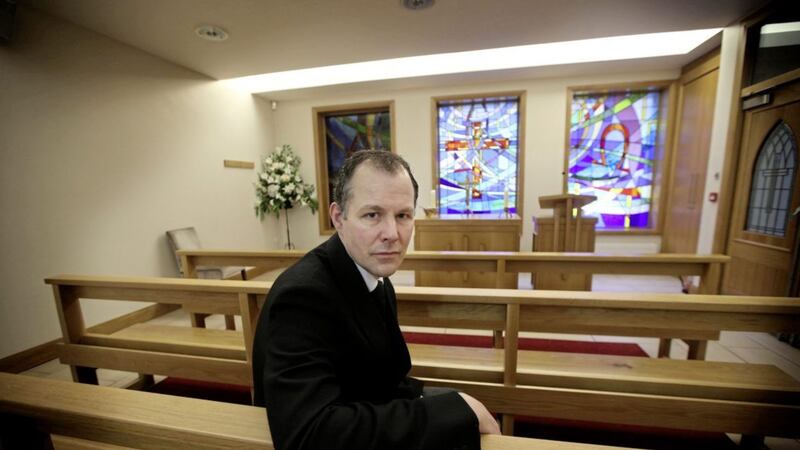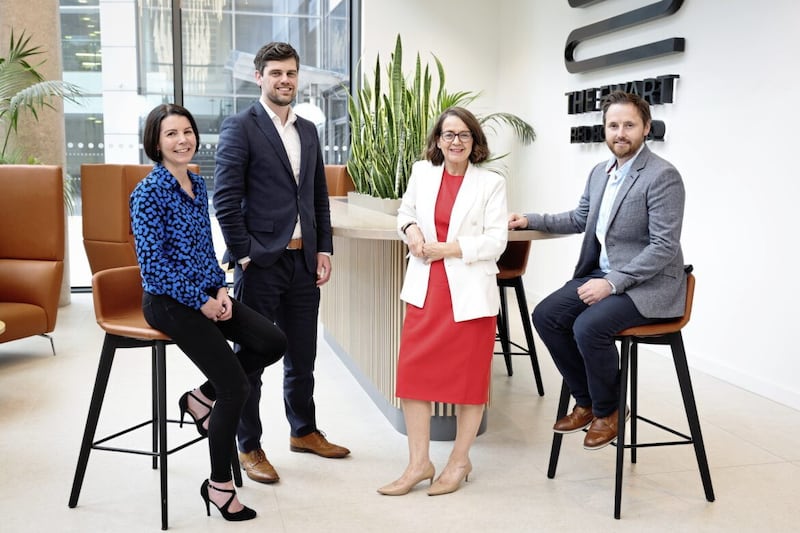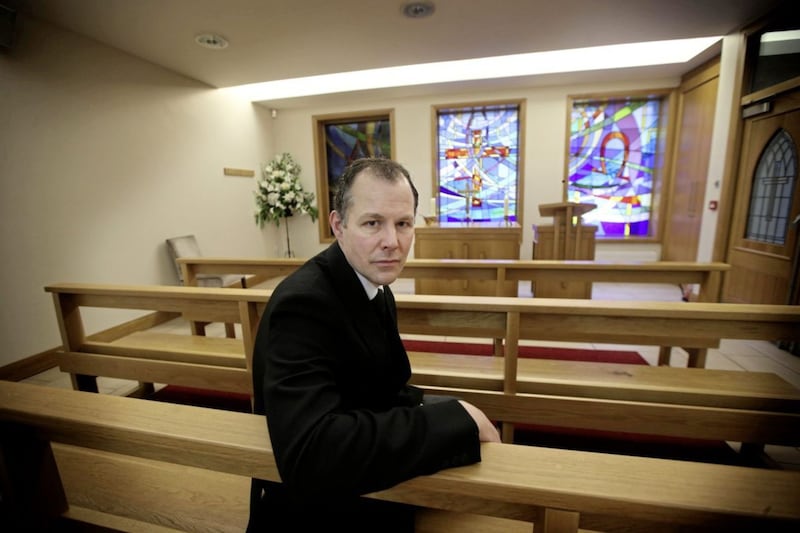.North Belfast man Hugh Dougal has worked as a funeral director for 20 years but it is the last 10 months he describes as the hardest of his career so far.
The father-of-three became the owner of O'Kane's Funeral Directors in Donegall Street in Belfast city centre two years ago, following the death of his father.
The business has been passed down through generations of his family but Hugh never thought he would be dealing with the fall-out of a pandemic during his time at the helm.
During April last year, Hugh and his staff found themselves going from undertaking an average of 30 funerals a month to almost 70 as the devastating effects of Covid-19 were felt.
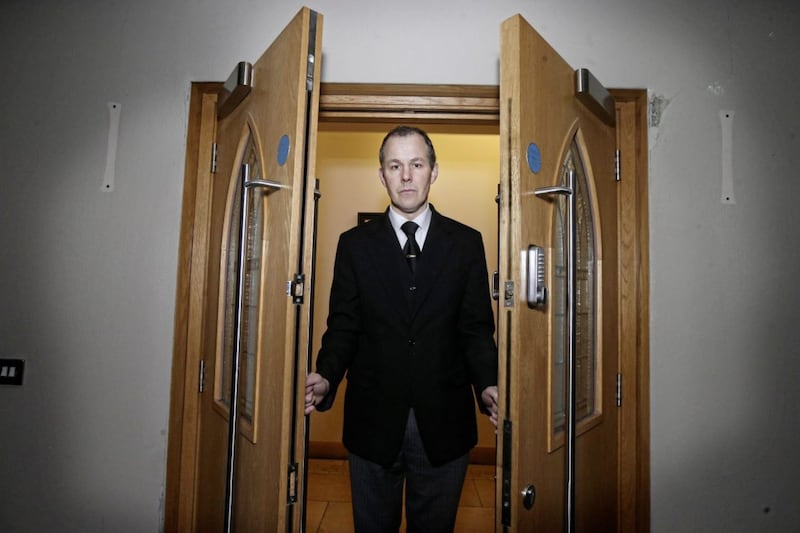
"When it initially came here, it had all happened in England and you could see the amount of deaths going up," he said.
"Suddenly, in April time, it really started to hit Northern Ireland. In the month of April, we did twice as many funeral as what we would do normally.
"It was a very, very stressful time".
The funeral director said the initial problem was obtaining PPE for himself and his staff.
"It was very difficult to come by," he said.
"England had the first wave. All the stock was bought up. When somebody passes away with Covid, they have to be put into a sealed body bag. It was very difficult to buy them.
"The main supplies had been bought up by the hospitals. The government weren't giving us anything."
All funeral directors were then issued with strict guidelines.
"When somebody passes away, they are brought to the mortuary," he said.
"We go to the mortuary and remove them in a normal coffin and bring them back. They are hygienically cleaned, embalmed and then presented in the coffin.
"Loved ones give us a photo so we can do their hair and make-up and they bring clothes and have them laid out. They then stay in the funeral home or are brought home for a wake.
"When somebody has Covid, that changes everything.
"In the mortuary, they are put into a coffin. We couldn't do what we normally do. The coffin would then be placed in a restricted area in the funeral home and nobody could come down to view the coffin or pay their respects.
"It was a closed coffin the whole time. Never opened.
"They weren't even allowed to come down to even view the coffin in our Chapel of Rest."
Mr Dougal said Covid also took away the personal touch with funerals.
"We were advised to do everything over the phone," he said.
"It was awful. People weren't getting to say goodbye the way they usually would. You saw the look on their faces.
"There was no wake. When it was Covid, they are taken straight to Roselawn or the cemetery.
"The crematorium was the worst. You stop at the gates and then they (relatives) drive away.
"We tried to take videos on our phones of the coffin being put into the hearse at the funeral home and driving up there and going there."
Mr Dougal said on some occasions, he and his team were asked to drive past the deceased's home where family, friend and neighbours gathered for prayers.
"People gave them a round of applause when they were leaving," he said.
"It was hard. We had circumstances where a husband and a wife died shortly after each other due to Covid and your heart went out to that family. It was so cruel for this to happen. They lost their mummy and suddenly their daddy passed away as well."
There have been times when families have pleaded to be allowed to see a loved one or bring them home to wake.
"We have that burden on our shoulders," he said.
"It has been horrendous. It has been the most difficult time in my life for working in the funeral business.
"It's just something I never envisaged happening here. You are trying to do your best, trying to give as much comfort as we can, but are so restricted."
Mr Dougal said the last 10 months had also been difficult for his staff.
"It's very draining on them and we do keep an eye on it because we are having to work so many hours and that impacts on home life."
He added: "I just can't wait to get back to normal and be able to our job the way we normally did."
:::::::::
Ciaran Fitzpatrick became the owner of Seamus Fitzsimons Funeral Directors in Downpatrick in 2012.
At the end of 2019 the firm was already dealing with deaths as a result of a bad flu which was circulating but soon, the heartbreaking impact of Covid-19 arrived.
"At the start, it was all a bit of a bombshell," said the 42-year-old.
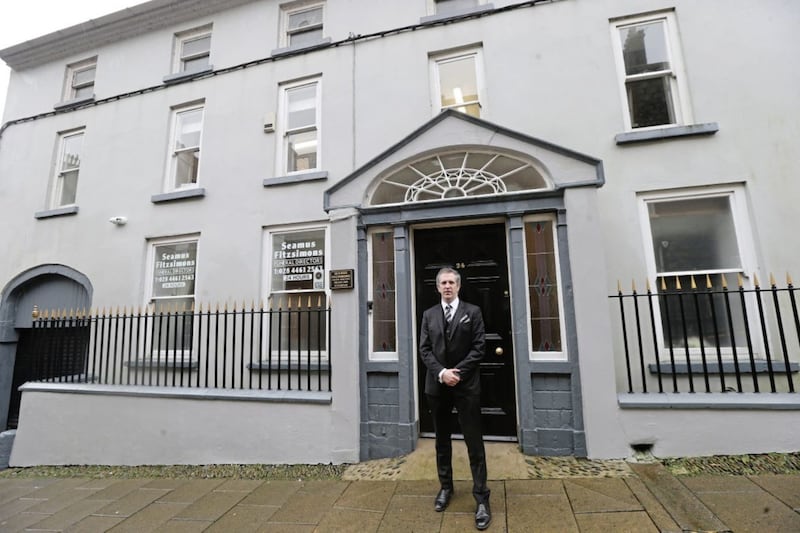
"All the regulations came out about PPE and there was shortages. We had to go to building companies, we had to go to friends in construction, who had PPE for asbestos.
"At one stage we had to wear PPE from head to toe. The council wanted us to wear this at the council graveyard."
The father-of-three said the regulations made for some "terrible" scenes at funerals.
On some occasions, council officials met the funeral at closed cemetery gates and counted the number of mourners before letting the cortege in.
"It was down to 10 people being allowed in through the gates," he said.
"We had grandchildren jumping over the fence to get into see their grandparents' burial.
"You had people standing on the road side and watching their relations' funeral, outside the fence. It was terrible.
"We did our best to inform families. It was all a rolling situation."
Mr Fitzpatrick said the rules around Covid deaths may also lead to future problems for those who were not allowed to properly grieve for a loved one.
"Covid cases were straight into a body bag and straight into the coffin and the coffin was closed," he said.
"At one stage, the churches were closed so it was straight to the cemetery.
"It was awful for people
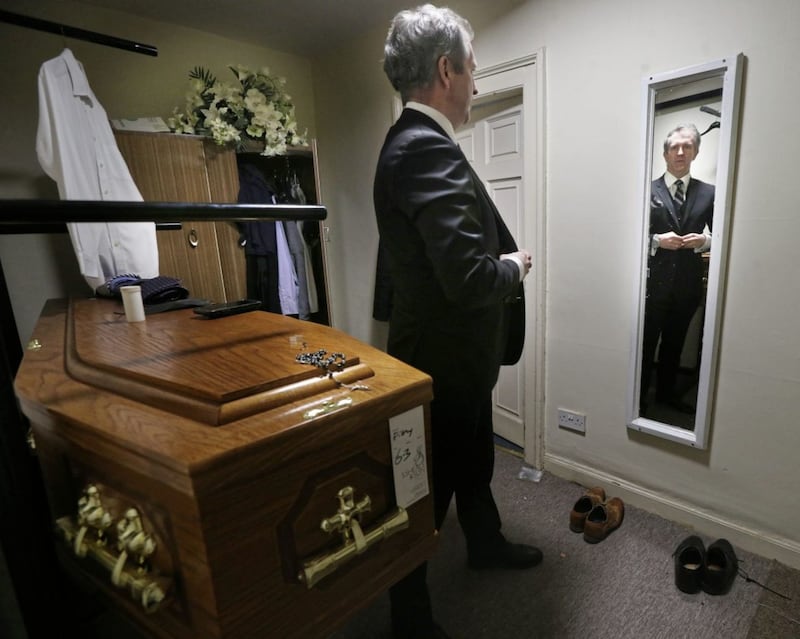
"A lot of people are not getting to grieve for their loved one. These people are going to suffer with their mental health. The Irish wake was a great way of grieving but that's all gone and those people don't get the chance to grieve for their loved ones properly."
Mr Fitzpatrick said between 15 to 20 per cent of his firm's funerals have been Covid deaths, but there has also been a knock-on effect from coronavirus.
Families are having to "sacrifice" for the greater good by having limited funerals even though their loved ones didn't have Covid-19.
He added: "The other people who didn't get their medical treatment because of Covid and died suddenly at home. They are a victim as much. They are dying because of Covid but not from Covid.
"You have to keep going. Funeral directors always go beyond the call of duty. We do everything we can for a family. We have to get a list of everybody who's going to a funeral beforehand for contact tracing."
The Downpatrick man said he fears for the mental health of funeral directors in the aftermath of the pandemic.
He said any worry about Covid-19 that he or his team would have goes to the "back of their heads as duty comes first".
"The responsibility to that family would override that," he said.
"Funeral directors will need help in the future with their mental health.
"You can't bring it home to your house. You try to lead a normal, family life.
"You could hit a wall."
Mr Fitzpatrick said some kind of support for funeral directors needed to be established.
"People are good at rallying around each other, families too," he said.
